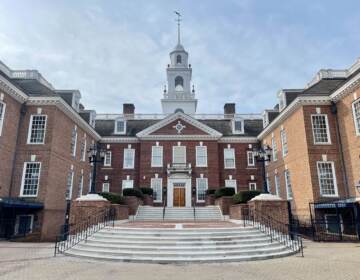Many of Pa.’s GOP gubernatorial hopefuls see a blueprint in Texas abortion law
GOP lawmakers have been pushing bills that would further restrict abortion and the debate is poised to become key in Pennsylvania’s 2022 gubernatorial race.

In this Thursday, May 23, 2019 file photo, Demonstrators chant slogans during a rally in support of abortion rights in Miami. (AP Photo/Lynne Sladky, File)
With a ban on abortions after six weeks of pregnancy now in effect in Texas, and rampant speculation that a conservative U.S. Supreme Court might be willing to overturn Roe v. Wade to usher in abortion restrictions more broadly, the issue is being freshly debated in statehouses across the country.
With Democratic Gov. Tom Wolf, a staunch abortion rights proponent, more than halfway through his second term, that debate is poised to become key in Pennsylvania’s 2022 gubernatorial race.
In the Republican field, nearly all the major candidates say they’d support following Texas’s lead.
The GOP field is crowded, and still forming. But of six likely candidates, five have indicated they’d support some form of abortion restriction.
State Sen. Doug Mastriano, a close ally of former president Donald Trump who is widely expected to run for governor, didn’t respond to a request for comment. But he wrote on his Facebook page that the U.S. Supreme Court’s lack of action to block the Texas law is “great news” and “a victory for States’ rights.” He has also sponsored legislation in the past that would functionally outlaw most abortions by banning them after six weeks.
A spokesperson for Lou Barletta, the former Pennsylvania congressman and unsuccessful 2018 U.S. Senate candidate, said in a statement that “everyone knows that Lou Barletta is pro-life,” adding that Barletta is “not going to predict what kind of legislation will come to his desk, but when he’s governor he will be a pro-life governor.”
Charlie Gerow, a longtime GOP strategist now running for governor, said while he’s not convinced the court is primed to formally uphold Texas’s law or overturn Roe v. Wade, he’d be happy to see significant abortion restrictions in Pennsylvania.
Specifically, he said, he supported a bill that passed the legislature in 2019 that would have banned abortions performed on a basis of a Down syndrome diagnosis, and a 2017 bill that would have narrowed the state’s legal abortion window from 24 to 20 weeks and banned a common procedure known as dilation and evacuation. Democratic Gov. Tom Wolf vetoed both of those bills.
“I think that scaling back abortion is a good idea,” Gerow said. “We have way too many abortions in Pennsylvania, way too many in America. And the old adage about it being rare is completely out the window.”
According to the CDC, about 619,000 abortions were performed nationwide in 2018 — or roughly 11.3 abortions per 1,000 women aged 15–44 years, and 189 abortions per 1,000 live births. Of the abortions performed, 92% were at 13 weeks’ gestation or sooner.
Joe Gale, a Republican Montgomery County commissioner who has, like Mastriano, positioned himself as a close Trump ally, said in an email that “the heartbeat legislation in Texas is a step in the right direction towards ending the atrocity of abortion.”
As governor, Gale said, he would make it his “utmost priority to protect every child from the moment of conception. Allowing the most defenseless and voiceless among us to be legally murdered in the womb is unacceptable, unethical and unforgivable. Under my leadership, Pennsylvania will be a sanctuary state for innocent unborn life.”
A Republican state senator who has expressed interest in running for governor, Lancaster County’s Scott Martin, wasn’t immediately available for comment. But his votes on previous bills give a picture of his leanings. Martin voted in favor of both the 2017 dilation and evacuation ban, as well as the 2019 bill banning abortions based on Down syndrome.
The other state senator seriously weighing a run, Erie County’s Dan Laughlin, is so far the sole member of the expected GOP field who has taken a significantly different position.
In an interview, Laughlin was unequivocal: he believes Pennsylvania’s current abortion law, which allows the procedure until 24 weeks’ gestation, is a good “middle ground” and shouldn’t be changed. If he were to become governor, he says he would veto any any bill that either expanded or contracted Pennsylvania’s current abortion laws.
“I consider myself to be fairly pro-life on a personal level,” he noted. “But this is not a space that I’m willing to step into and start telling women what they should do.”
He added that he thinks the six-week abortion ban that Texas adopted and his opponents have backed is “on the wrong side of history” and a “radical position.”
This position isn’t new. Like Martin, Laughlin has a voting record on abortion. He was one of the only Republicans in his chamber to oppose both the 2017 dilation and evacuation ban and the 2019 ban on Down syndrome-based abortions.
‘Hostility to Roe’
It’s still unclear exactly if, or how, Texas’s new law will affect other states.
The rule bans most abortions when a heartbeat is detected. That usually happens around six weeks — before many people know they are pregnant. Texas’s novel approach allows private citizens to sue anyone involved in carrying out an abortion, like a doctor, a person who funds the procedure, or someone who gave the recipient of an abortion a ride to a clinic.
The Supreme Court hasn’t explicitly ruled on it — it merely chose not to block the law from taking effect. But Bruce Ledewitz, a Duquesne University constitutional law professor who follows abortion law closely, said he can’t see any way to interpret the lack of action that doesn’t show that the court is willing to overturn Roe v. Wade or other key legal precedents.
The Roe decision, in 1973, saw the U.S. Supreme Court rule that laws are unconstitutional if they violate a woman’s right to privacy in seeking an abortion, while also saying the state has a role to protect “the potentiality of human life.” The court said that “potentiality” changes during the course of pregnancy and abortion bans are allowed when a fetus is “viable,” which is generally considered to be around 22 to 24 weeks.
Another case, 1992’s Planned Parenthood v. Casey, resulted in a similarly influential ruling that states cannot impose an “undue burden” on a person’s right to get an abortion.
The courts have consistently upheld those decisions ever since. But Ledewitz, like many legal experts, says the Texas bill is “obviously” inconsistent with Roe, at the very least.
He notes, the five-justice group that decided not to rule on the Texas law has said it plans to rule on it later, but he believes that “a law like this involving any other subject but abortion would obviously be found unconstitutional and would have been stayed.”
“One can clearly see that it is hostility to Roe that allowed the Texas law to go into effect — that probably means that there’s a five justice majority to overturn Roe, or at least to limit it so restrictively that it will, for all practical purposes, be overturned,” he said.
Republican candidates and legislative staffers haven’t been so willing to make that kind of bold prediction.
In the GOP-controlled legislature, from whence any abortion bill would have to come in order for a potential GOP governor to pass it, House and Senate leaders have been coy about whether the court’s latest move will play into their agenda.
House GOP spokesman Jason Gottesman noted his chamber has already passed two bills this session that were broadly seen as anti-abortion. One is a retread of the bill Wolf vetoed last session that would have banned abortions performed on the basis of a Down syndrome diagnosis; the other would require the burial of fetal remains.
“We’re still in the process of reviewing the [Texas] decision,” Gottesman said. “I think the bills that we’ve previously passed out of the House speak for themselves.”
Neither bill has passed the Senate yet, though the chamber has already begun moving the Down syndrome measure after passing it last session. Senate GOP spokeswoman Erica Clayton Wright said the chamber is still “discussing the fall legislative agenda and will be able to provide updates in the next week or so.”
The House and Senate have historically been unwilling to pass bills banning abortions at six weeks. Versions of such a measure introduced last session in both chambers died without receiving committee votes. Before the Texas bill took effect, six-week bans had been repeatedly struck down in court.
That unwillingness held true under Pennsylvania’s last Republican governor, Tom Corbett, who presided over GOP majorities in both chambers from 2011 to 2014. The closest he got to restricting abortion was a bill that prohibited coverage for abortions under the Affordable Care Act’s state insurance exchange plans, and another that required abortion clinics to upgrade their facilities and pass surprise inspections. He also received wide criticism from the left for appearing to support a measure that would have required ultrasounds before all abortions — opponents called the requirement “emotionally intrusive” — but the bill never ended up on his desk.
Republicans also held trifecta control of government in Pennsylvania from 1995-2002, but did not narrow the 24 week abortion window.
Ledewitz, who describes himself as a generally anti-abortion Democrat, says if future Supreme Court abortion rulings do pave the way for more restriction on the procedure, he’ll be watching with interest to see what Pennsylvania Republicans are truly willing to support — especially if they’re no longer facing a certain veto from a Democratic governor.
“The first time a woman dies in a back alley abortion, the voters in that state are going to punish the legislature that wrote that statute,” he said. “I think a lot of legislators know that.”
For years, he argues, Republicans like Mastriano, Barletta, Gale and the other anti-abortion gubernatorial candidates have been advocating abortion restrictions “with the understanding that, you know, the laws are very likely to be stayed by the courts.”
If Roe is overturned, he said, “they won’t have that fiction anymore and they’ll actually have to act responsibly.”
This story has been updated to include additional comments from State Sen. Dan Laughlin.

Get more Pennsylvania stories that matter
WHYY is your source for fact-based, in-depth journalism and information. As a nonprofit organization, we rely on financial support from readers like you. Please give today.








